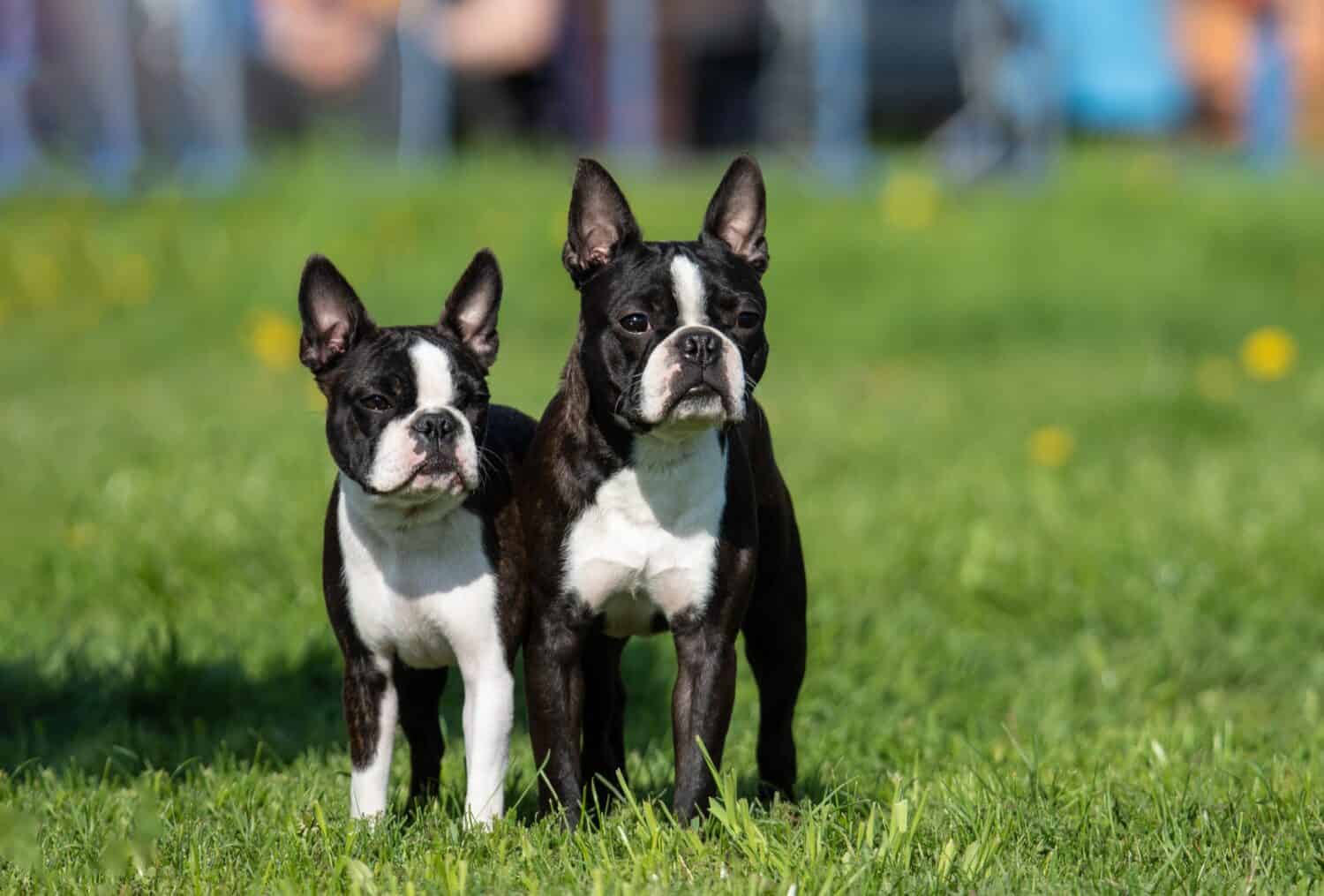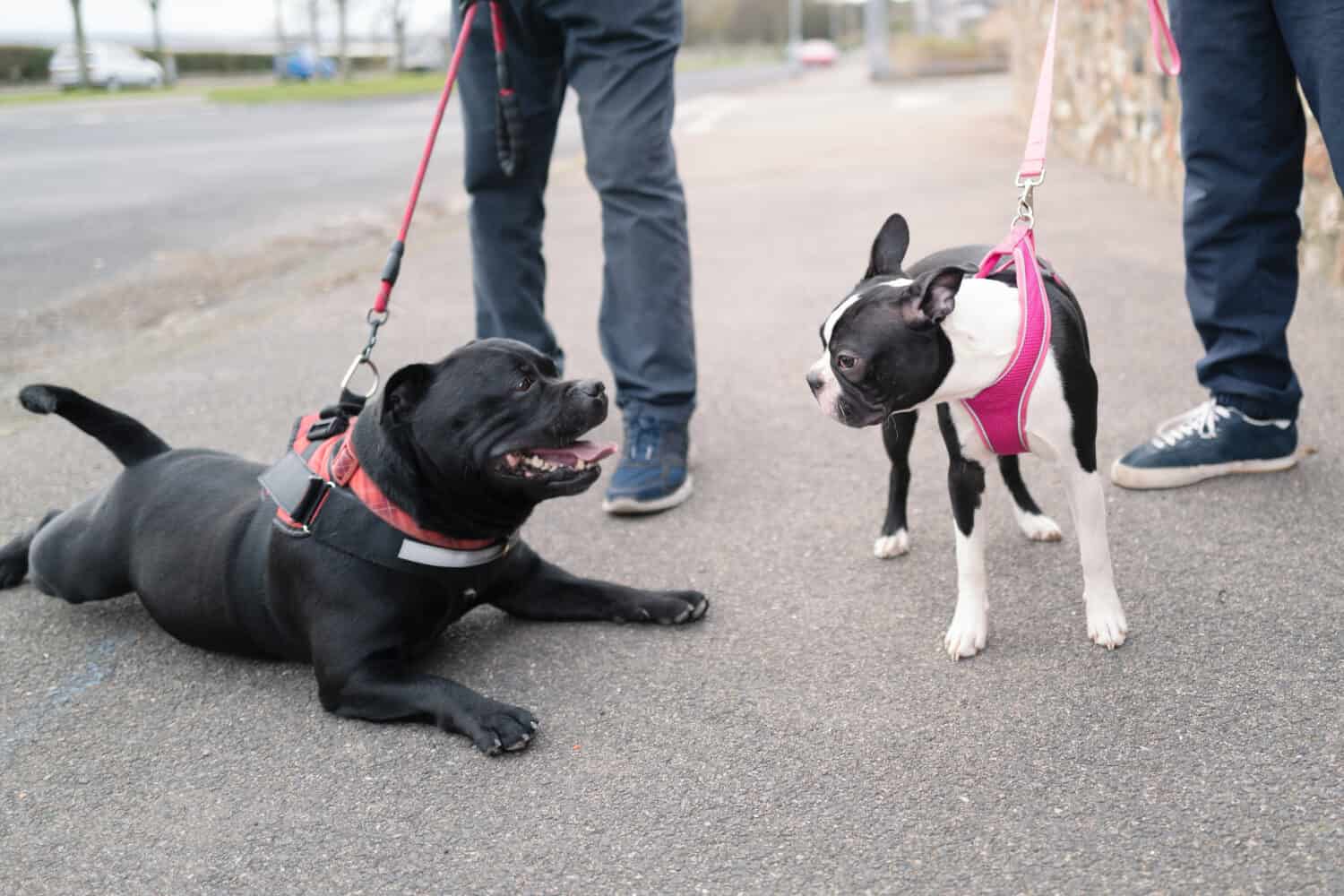Boston terriers are affectionate and charming dogs famous for their agility and playfulness. The Boston terrier is a breed that is intelligent, loving, and often celebrated for its small size and big personality. While the two sexes have noticeable physical differences, there are also subtle behavioral and temperamental differences between male and female Boston terriers.
Here, we’ll outline the key differences between male and female Boston terriers. Whether you’re looking for a pet or a show dog, it’s essential to understand how basic biology can influence the behavior and experience of having a Boston terrier of your own. Both female and male Boston terriers are great pets for homeowners because they are genuinely empathetic and brilliant.
The terriers fit the bill when looking for compassionate and gentle dog breeds. It is challenging to differentiate between male and female Boston terriers by physical comparison. They both have muscular, sturdy, small bodies with large ears and flat noses.
Nevertheless, you can pick some striking features to differentiate between the two, after which you can choose the gender most suitable for your needs.
Comparing Male vs. Female Boston Terrier
| Gender | Temperament | Build | Lifespan | Weight | Height |
|---|---|---|---|---|---|
| Female | Intelligent, independent, friendly | Lean, less muscle | 13 -15 years | 9-20 lbs | 9-15 ins |
| Male | Clingy, playful, friendly | Bulky, lots of muscle | 13 -15 years | 10-25 lbs | 15-17 ins |
The 8 Key Differences Between Male vs. Female Boston Terriers
1. Male vs. Female Boston Terrier: Physical Differences
Like most other animal species, male Boston terriers usually are more prominent than females.
Females
Adult female Boston terriers vary between nine to 15 inches. Their weights vary between 9 and 20 pounds. Female Boston terriers are highly likely to become overweight because of their eating habits. They love eating all the time.
Please don’t allow your female terrier to weigh over 20 pounds because this can lead to serious health risks, especially when they are pregnant.
Males
Male terriers are more prominent and taller than their female counterparts. An adult male terrier typically stands 17 inches tall and weighs between 10 and 25 pounds.
Their varying muscle mass is one of the critical causes of this weight disparity. Males have more muscle mass than females. Their muscle mass is due to their active nature.

Male Boston terriers have more muscle mass compared to other female counterparts due to their more active nature.
©bubutu/Shutterstock.com
2. Male vs. Female Boston Terrier: Temperamental Differences
Temperamentally, male Boston terriers are known to be energetic and outgoing, while females tend to be more independent and reserved. This is a striking feature of Boston terriers.
Females
Female terriers aren’t as affectionate and active as males because they are more cautious with strangers. However, they are attentive and alert and can be great companions to your kids.
Surprisingly, they are more dominant than male terriers. They mature faster than their male counterparts and will play the ‘alpha dog’ if you have other dogs. Female dogs are more intelligent and will learn commands more quickly than males. This is also one of the reasons they feel bossy around other dogs.
Males
Unlike their female counterparts, the male Boston terrier is more affectionate, playful, and friendlier. They are also better tempered and can be great playmates and companions to kids.
It is also easier to house-train them, meaning they are less messy than the females. Male terriers are easier to maintain and groom than females.
They have short attention spans and are prone to distractions. So you will require lots of patience when training them.
They lose focus because they take longer to mature and are very playful. Nevertheless, they are easygoing and calmer than the female Boston terriers.

Female Boston terriers can be better companions for kids despite being more cautious with strangers.
©sophiecat/Shutterstock.com
3. Male vs. Female Boston Terrier: Trainability
Females
Both female and male Boston terriers are naturally intelligent and curious, but what differentiates them is how quickly they pick up commands. Generally, females learn faster and adapt quickly to new environments. Furthermore, they are more attentive and focused than males.
During training, they will try to impress and please you, so they’ll learn quickly. And because of their authoritarian and can-do attitude, they outperform the males in many other ways. For example, they yearn for mental stimulations like high-fives and praises. And because they are intelligent, they dislike repetitive actions and are bored easily.
Males
Male terriers are spunkier and more playful than females. They are slow to mature, explaining why they are also slow to learn. Male terriers get bored faster because they are enthusiastic and easily distracted. As a keeper, this implies that you must put in more training hours to make some headway.
Male terriers don’t like firm environments. Instead, they prefer softer treatments with positive gestures and affirmations. Otherwise, they will go off-course. They want you to praise them constantly and, if possible, provide them with treats during training. You need to be creative by finding ways to stimulate them mentally.

Male Boston terriers require a softer approach in terms of training, coupled with positive affirmations and gestures.
©dezy/Shutterstock.com
4. Male vs. Female Boston Terrier: As Guard Dogs
When looking for guard dogs, Boston terriers are a great choice.
- One, just like Spanish water dogs, they are more protective than most dog breeds.
- Second, they only like to bark if something is abnormal or utterly wrong.
- Third, their hearing senses are excellent, and they are very keen.
Other than the mentioned traits, it is advisable to consider the kind of guard work you expect them to do, the amount of training required, and most importantly, the environment you expect them to operate in.
Females
Female terriers are not better guard dogs than male terriers.
However, they can also perform well as guard dogs for the following reasons:
- They protect small territories better
- They are more suspicious and cautious about strangers
- They protect specific people better
- They are easier to train
Males
Male terriers are better guard dogs and can allow you to sleep peacefully. They protect you from intruders, both humans and other animals.
They are a better option for the following reasons:
- They are more muscular and larger
- They are more agile and quicker
- They have stronger bites
- They can protect an entire territory
- They can protect all members of the family, not just their preferred individual
- They have an excellent sense of urgency

Male Boston terriers make better guard dogs thanks to their agility and stronger bites.
©natali.lymarenko/Shutterstock.com
5. Male vs. Female Boston Terrier: Health Differences
Health is a big issue when dealing with Boston terriers. The primary health challenge they face is respiratory problems or brachycephaly syndrome. This dog species has narrow nostrils, so they mostly breathe through their mouths.
Doing so means their lungs have limited airflow, leading to overheating. Most health challenges terriers face result from their anatomy. Since the body structures of male and female terriers are slightly different, their health challenges also differ, as explained below:
Females
Female terriers face health challenges during reproduction because they have a broad-shaped head and small pelvis.
They find it hard to pass the puppies through their narrow pelvis when giving birth. In most cases, a C-section may be required to protect them and their puppies.
Other common health problems female terriers face include Respiratory Distress Syndrome, Cushing’s Disease, spinal deformities, cataracts, cherry eyes, and Legg-Calve-Perthes Disease.
Since female terriers aren’t as active as their male counterparts, they are highly likely to fall sick during a disease outbreak. However, when you provide them with basic medical care and nutrition, your female terriers will have happier and healthier lives.
Males
Male terriers are hardier than their female counterparts, making them not prone to too many health challenges. Besides, they are also more playful and active.
However, their agility makes them more likely to suffer from bone and hip injuries.
The injuries most male terriers develop are kneecaps that pop out of place (patellar luxation), herniated discs (back problems), and hip dysplasia (improper hip placement). Some of these problems may cause arthritis.
If you leave your male terrier unneutered, prostate or testicular cancer may occur later in their lives. However, neutering your male Boston terriers requires good timing. Wait until they are mature enough to prevent orthopedic issues.

Boston terriers face a number of health challenges, such as Respiratory Distress Syndrome, Cushing’s Disease, spinal deformities, and cataracts.
©sophiecat/Shutterstock.com
6. Male vs. Female Boston Terrier: Relationship With Children
As expected, terriers are energetic and non-aggressive, making them ideal playmates for children with high energy levels. Their sizes – neither too small nor too big, make them a good choice for playing with kids. However, how male dogs relate to children differs from that of females.
Females
Female dogs aren’t as playful as the males; neither are they as active. They tend to be loyal only to specific persons in the house.
Once they develop a friendship with one of your kids, they’ll ignore the rest of the family members. You will often find them clinging and playing with the same kid.
Female Boston terriers aren’t playful and would rather lounge around the house all day than play.
However, they enjoy playing with children of all ages and are pretty friendly. With that said, it is prudent to watch out for your dog and kids when playing together to prevent accidents.
No matter your kids’ ages, it will take time for the female terriers to get used to them and everything else in your house. Try to allow all your children a chance to understand your dog so everyone can be happy around it.
Males
Male dogs are more affectionate, clingy, playful, and energetic than female dogs. They are pleasant to everyone. They are caring, making them the best companions for your children and the entire family.
Male terriers can be aggressive. Hence they should be appropriately trained before being allowed to socialize with children.
Do not leave your small kids to play unsupervised with the dog, which may result in injuries or accidents.

Female Boston terriers are often more loyal to one individual in the house, thus ignoring the rest of the household members.
©bubutu/Shutterstock.com
7. Male vs. Female Boston Terrier: Relationship With Other Dogs
Dogs are territorial animals that can feel threatened when a new puppy comes in. Boston terriers are no exception, and it is even more of a concern because they crave attention and affection from their owners.
Females
Female dogs are more reserved and cautious. They are, however, playful and friendly with other pets. Same-sex aggression is more dominant in male dogs than female ones.
And even after socializing and adequately training your female terriers, they will still exhibit their dominating tendencies.
Males
Unneutered male Boston terriers are very territorial. They know how to place marks around the house to assert their dominance. They also have same-sex aggression, so you must be careful when bringing a male dog to join your family.
On the contrary, neutered and well-trained male terriers can socialize well with other dogs. You can leverage their high energy levels to teach them to socialize with other dogs during dog walking.

Neutered male Boston terriers socialize well with other dogs compared to their un-neutered counterparts.
©Katho Menden/Shutterstock.com
8. Male vs. Female Boston Terrier: Relationship With Other Pets
Your terrier’s interactions with other pets rely on their temperaments and dispositions. But Boston terriers are known for getting along nicely with other animals, especially cats.
A Boston Terrier Society survey conducted on Twitter found that terriers provide great companionship for cats. This is because of their loving and kind temperament. Of course, terriers can become stubborn occasionally, but they are canny and will relate well with all the pets in your house.
With a proper introduction, Boston terriers are very friendly. They are more social than other terrier breeds.

Boston terriers can provide great companionship to other pets thanks to their kind and loving temperament.
©Christine Bird/Shutterstock.com
Choosing the Best Boston Terrier Gender for Your Family
From the preceding discussion, you can appreciate that choosing between a male vs. female Boston terrier is difficult. Both genders have unique characteristics. Your preferences and family situation will therefore influence your decision.
Considering the benefits of each gender could help you make a more informed choice.
Advantages of Female Boston Terriers
- They love to please their owners
- They socialize well with other dogs
- Less hyper
- Highly trainable
- More mindful
Advantages of Male Boston Terriers
- More patient
- More active
- Socialize well with other dogs and pets in the house
- Easier to housebreak
- Provide good companionship for children
As you can see, no matter the gender you choose, you can be 100% sure you are dealing with a family-friendly dog when you welcome a Boston terrier into your home. However, a female breed would fit the bill if you want a more intelligent and independent dog. Otherwise, you can choose a male terrier to be an easily housebroken, agile, and more protective dog.

Boston terriers make the perfect addition to a family, whether female or male.
©mlorenz/Shutterstock.com
Caring for Your Boston Terriers
Boston Terriers require some effort to keep them healthy. They are an ideal breed for those looking for a low-maintenance pet.
To keep your paw friends healthy, you need to:
- Give them a balanced diet
- Allow them to exercise
- Groom them regularly
- Socialize and train them early
- Take them to the vet regularly
Purchase a new dog from a reputable, knowledgeable, and ethical breeder. This will ensure you get a healthy dog that will not infect the other pets you have at home.
All in all, Boston Terriers are the best dog breed known for their friendliness and trainability. They also provide better protection and can be fun to be around. Don’t hesitate to take your dog to a vet if you notice any health issues.
Overall, both male and female Boston terriers are highly affectionate, loyal, and energetic dogs, perfect for families with children. While they may exhibit minor differences in temperament due to their gender, they ultimately make an excellent pet choice. Consider both genders when looking for the perfect Boston terrier for you!
The photo featured at the top of this post is © Zakharova_Elena/Shutterstock.com
Ready to discover the top 10 cutest dog breeds in the entire world?
How about the fastest dogs, the largest dogs and those that are -- quite frankly -- just the kindest dogs on the planet? Each day, AZ Animals sends out lists just like this to our thousands of email subscribers. And the best part? It's FREE. Join today by entering your email below.
Thank you for reading! Have some feedback for us? Contact the AZ Animals editorial team.






